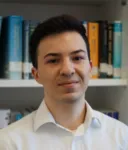
Rui Xing
2022-2025: MSc Engineering at Tianjin University
2018-2022: BSc Engineering at Tianjin University
After receiving a systematic basic education in chemical engineering at the School of Chemical Engineering and Technology, Tianjin University, I chose to explore the deactivation mechanism of industrial catalysts for CO₂ hydrogenation under harsh conditions at Tianjin University. Through this research experience, I deeply realised the importance of reaction kinetics and mechanism research, not only for the apparent activity of the reaction but also for the stability of the catalyst.
Currently, I have joined Professor Hülsey's research group to design an electrochemical reaction system for CO₂ capture, contributing to carbon neutralisation. When designing a new reaction system, he will pay more attention to the optimisation of the reaction interface to reduce unnecessary energy waste.
Office: CRC 2011
Email: rui.xing@tum.de

Katharina Blank
2022-2025: MSc Chemistry at Technical University of Munich
2017-2021: BSc Chemistry at Ludwig-Maximilians University Munich
After exploring my broad interest in science during my bachelor’s degree in chemistry at Ludwig-Maximilians-Universität Munich, I chose to specialize in inorganic chemistry and catalysis during my master’s studies at the Technical University of Munich. I deepened this focus in my master’s thesis, where I worked on the photothermal synthesis of methanol under the supervision of Prof. Jennifer Strunk, graduating in 2025.
Currently, my research centers on the kinetics of surface transport processes in thermally activated catalytic systems, with a particular focus on the understanding of hydrogenation reactions.
Office: CRC 2011
Email: katha.blank@tum.de

Florian Musialek
2021-2024: MSc Chemistry at RWTH Aachen
2017-2021: BSc Chemistry at Paderborn University
Following his interest in science, he got his Bachelor's degree in chemistry focusing on surface chemistry and technical chemistry at Paderborn University. During his master's course at RWTH Aachen, he developed a deep interest in electrochemical systems and process engineering. His thesis dealt with the quantification of ion fluxes across bipolar membranes during the electrochemical CO2 reduction.
Currently, at the Technical University of Munich, he is trying to enable catalysis on untraditional materials using electrode polarisation trying to achieve novel selectivities and high activities under mild conditions.Other side projects include measuring kinetic isotope effects of carbon during the CO2 reduction reaction to give unprecedented insights into the reaction mechanism and the supervision of a research internship dealing with the quantification of open cell voltage relaxation kinetics.
Office: CRC 2011
Email: florian.musialek@tum.de

Antony James
2023-2024: MSc Chemistry at Indian Institute of Science
2019-2023: BSc Chemistry at Indian Institute of Science
Inspired to find solutions to the global climate crisis after the devastating 2018 Kerala floods, Antony pursued a bachelor’s in chemistry at the Indian Institute of Science (IISc). For his undergraduate thesis, he worked on CO₂ activation using Frustrated Lewis Pair compounds in the lab of Prof. Geetharani Kalimuthu. He continued at IISc for his master’s studies, conducting a mechanistic investigation of novel oxygen evolution reaction electrocatalysts in the lab of Prof. Chinmoy Ranjan.
Antony then chose to pursue his doctoral studies in the Hülsey Lab, where his research focuses on developing methodologies to correct interfacial pH swing effects in sweep voltammetry of proton-coupled electron transfer (PCET) reactions.
Office: CRC 2011
Email: antony.james@tum.de